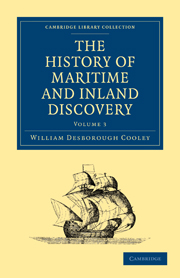Book contents
- Frontmatter
- Contents
- CHAP. I PROGRESS OF GEOGRAPHICAL SCIENCE
- CHAP. II VOYAGES OF BYRON, WALLIS, CARTERET, ETC
- CHAP. III COOK'S FIRST VOYAGE
- CHAP. IV COOK'S SECOND VOYAGE
- CHAP. V COOK'S THIRD VOYAGE
- CHAP. VI COOK'S THIRD VOYAGE CONTINUED
- CHAP. VII VOYAGE OF LA PEROUSE, ETC
- CHAP. VIII EUROPEANS IN THE SOUTH SEA
- CHAP. IX THE COASTS OF AUSTRALIA
- CHAP. X INTERIOR OF NEW HOLLAND
- CHAP. XI VANCOUVER'S VOYAGE
- CHAP. XII INTERIOR OF NORTH AMERICA
- CHAP. XIII ROSS AND PARRY
- CHAP. XIV PARRY'S VOYAGES
- CHAP. XV JOURNEY OF CAPTAIN FRANKLIN
- CHAP. XVI SECOND JOURNEY OF CAPTAIN FRANKLIN
- CHAP. XVII HUMBOLDT'S TRAVELS
- CHAP. XVIII HUMBOLDT'S TRAVELS CONTINUED
- CHAP. XIX SOUTHERN EXTREMITY OF AMERICA
- CHAP. XX EASTERN SHORES OF ASIA
- CHAP. XXI TRAVELS IN THE HIMALYEH
- CHAP. XXII BRUCE'S TRAVELS
- CHAP. XXIII PARK'S TRAVELS
- CHAP. XXIV DENHAM AND CLAPPERTON'S TRAVELS
- INDEX
CHAP. XIX - SOUTHERN EXTREMITY OF AMERICA
Published online by Cambridge University Press: 05 October 2010
- Frontmatter
- Contents
- CHAP. I PROGRESS OF GEOGRAPHICAL SCIENCE
- CHAP. II VOYAGES OF BYRON, WALLIS, CARTERET, ETC
- CHAP. III COOK'S FIRST VOYAGE
- CHAP. IV COOK'S SECOND VOYAGE
- CHAP. V COOK'S THIRD VOYAGE
- CHAP. VI COOK'S THIRD VOYAGE CONTINUED
- CHAP. VII VOYAGE OF LA PEROUSE, ETC
- CHAP. VIII EUROPEANS IN THE SOUTH SEA
- CHAP. IX THE COASTS OF AUSTRALIA
- CHAP. X INTERIOR OF NEW HOLLAND
- CHAP. XI VANCOUVER'S VOYAGE
- CHAP. XII INTERIOR OF NORTH AMERICA
- CHAP. XIII ROSS AND PARRY
- CHAP. XIV PARRY'S VOYAGES
- CHAP. XV JOURNEY OF CAPTAIN FRANKLIN
- CHAP. XVI SECOND JOURNEY OF CAPTAIN FRANKLIN
- CHAP. XVII HUMBOLDT'S TRAVELS
- CHAP. XVIII HUMBOLDT'S TRAVELS CONTINUED
- CHAP. XIX SOUTHERN EXTREMITY OF AMERICA
- CHAP. XX EASTERN SHORES OF ASIA
- CHAP. XXI TRAVELS IN THE HIMALYEH
- CHAP. XXII BRUCE'S TRAVELS
- CHAP. XXIII PARK'S TRAVELS
- CHAP. XXIV DENHAM AND CLAPPERTON'S TRAVELS
- INDEX
Summary
The avidity for gold which actuated the first conquerors of America, and their ignorant belief that every spot that was secluded or difficult of access was the repository of nature's treasures, led them very soon into almost every recess of the South American continent. The same regions have been repeatedly viewed by modern travellers, who have surveyed them with more discerning eyes, and have added much to the information acquired by those who preceded them. The writings of Ulloa, Barrière, Luccock,Koster,Mawe, Helm, and others, all contain valuable information respecting the tropical regions of South America. But the analysis of these writers lies beyond the compass of a work the object of which is rather to trace the steps by which we first obtained a knowledge of the globe, than to follow through all its vicissitudes our progressive acquaintance with it.
The labours of Humboldt and of the Spanish hydrographers have contributed much to correct the map of the equatorial regions of America. The disputes also in which the courts of Lisbon and Madrid were for some time engaged respecting the southern limits of Brazil gave rise to enquiries calculated to improve geography. In 1781, don Felix de Azara was sent by the Spanish government with some other officers to determine on the spot with the Portuguese commissioners the boundaries of their respective dominions. The execution of the treaty agreed on between the two courts was embarrassed and retarded by the evasions of the Portuguese; but Azara, a man of an active spirit, and a good naturalist, was in the mean time usefully employed in exploring a part of the Spanish dominions but little known.
- Type
- Chapter
- Information
- The History of Maritime and Inland Discovery , pp. 275 - 287Publisher: Cambridge University PressPrint publication year: 2010First published in: 1831



